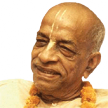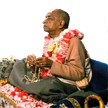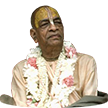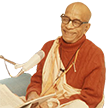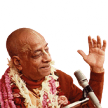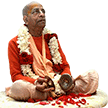Supreme Person - an essential subject: Difference between revisions
Visnu Murti (talk | contribs) (Created page with "Category:Essential Subjects <!----------------------- edit below this line -----------------------> <!------------------------ begin introduction text --------------------...") |
(Vanibot #0041: Moves Choose Another box to the end) |
||
| Line 2: | Line 2: | ||
<!----------------------- edit below this line -----------------------> | <!----------------------- edit below this line -----------------------> | ||
<!------------------------ begin introduction text ------------------------> | <!------------------------ begin introduction text ------------------------> | ||
Paramaḥ pumān means the ultimate Supreme Personality of Godhead. But He is always manifest in different incarnations, and of all the incarnation, Lord Rāma is the foremost, Balarāma. You have heard the name of Balarāma, Baladeva. Similarly Rāma, Rāma means the Supreme Enjoyer. We are taking advice from the Supreme Person. He says, "My dear Arjuna, you may be elevated to the highest planetary system, which is called Brahmaloka and is desirable because life there is very long." We cannot calculate even a half-day there. It is beyond our mathematical calculations. But even in Brahmaloka there is death. Therefore Kṛṣṇa says, "Do not waste your time trying to elevate yourself or transfer yourself from this planet to that planet." | |||
Srila Prabhupada's books, lectures, conversations and letters offer a comprehensive presentation of this essential subject as seen in the Vaniquotes '''[[Vaniquotes:Category:Supreme Person|Supreme Person]]''' category. An introduction from his books is given below in the following | Srila Prabhupada's books, lectures, conversations and letters offer a comprehensive presentation of this essential subject as seen in the Vaniquotes '''[[Vaniquotes:Category:Supreme Person|Supreme Person]]''' category. An introduction from his books is given below in the following 7 quotes. | ||
<!-------- end introduction text and don't touch next three lines ---------> | <!-------- end introduction text and don't touch next three lines ---------> | ||
---- | ---- | ||
== Quotes from Srila Prabhupada's books == | == Quotes from Srila Prabhupada's books == | ||
| Line 13: | Line 13: | ||
{{VaniQuotebox|In the Vedanta-sutra, devotional service is clearly indicated, but the Mayavadi philosophers refuse to accept the spiritual body of the Supreme Absolute Person and refuse to accept that the living entity has an individual existence|In the Vedanta-sūtra, devotional service is clearly indicated, but the Māyāvādī philosophers refuse to accept the spiritual body of the Supreme Absolute Person and refuse to accept that the living entity has an individual existence separate from that of the Supreme Lord. Thus they have created atheistic havoc all over the world, for such a conclusion is against the very nature of the transcendental process of pure devotional service. '''(Caitanya-caritāmṛta, Ādi-līlā 7.114)'''}} | {{VaniQuotebox|In the Vedanta-sutra, devotional service is clearly indicated, but the Mayavadi philosophers refuse to accept the spiritual body of the Supreme Absolute Person and refuse to accept that the living entity has an individual existence|In the Vedanta-sūtra, devotional service is clearly indicated, but the Māyāvādī philosophers refuse to accept the spiritual body of the Supreme Absolute Person and refuse to accept that the living entity has an individual existence separate from that of the Supreme Lord. Thus they have created atheistic havoc all over the world, for such a conclusion is against the very nature of the transcendental process of pure devotional service. '''(Caitanya-caritāmṛta, Ādi-līlā 7.114)'''}} | ||
{{VaniQuotebox| | {{VaniQuotebox|All a devotee's works are technically sacrifices because sacrifice aims at satisfying the Supreme Person, Visnu, Krsna. The resultant reactions to all such work certainly merge into transcendence, and one does not suffer material effects|He can become liberated because he knows his constitutional position in relationship with Kṛṣṇa, and thus his mind cannot be drawn from Kṛṣṇa consciousness. Consequently, whatever he does, he does for Kṛṣṇa, who is the primeval Viṣṇu. Therefore, all his works are technically sacrifices because sacrifice aims at satisfying the Supreme Person, Viṣṇu, Kṛṣṇa. The resultant reactions to all such work certainly merge into transcendence, and one does not suffer material effects. '''(Bhagavad-gītā 4.23)'''}} | ||
{{VaniQuotebox| | {{VaniQuotebox|All acts should be performed in conjunction with the Supreme Lord, represented by the words om tat sat, which indicate Visnu, the Supreme Person| In the third six chapters, knowledge, renunciation, the activities of material nature and transcendental nature, and devotional service were described. It was concluded that all acts should be performed in conjunction with the Supreme Lord, represented by the words oṁ tat sat, which indicate Viṣṇu, the Supreme Person. The third part of Bhagavad-gītā has shown that devotional service, and nothing else, is the ultimate purpose of life. '''(Bhagavad-gītā 18.1)'''}} | ||
{{VaniQuotebox| | {{VaniQuotebox|Although impersonal Brahman, Paramatma Brahman and Brahman as the Supreme Person are all on the same transcendental platform, the personal feature of the Supreme Brahman is the ultimate goal and last word in transcendence| Following the instructions of Lord Śiva, the Pracetās also concentrated their minds on the Śyāmasundara form of the Supreme Brahman. Although impersonal Brahman, Paramātmā Brahman and Brahman as the Supreme Person are all on the same transcendental platform, the personal feature of the Supreme Brahman is the ultimate goal and last word in transcendence. '''(Śrīmad-Bhāgavatam 4.31.3)'''}} | ||
{{VaniQuotebox| | {{VaniQuotebox|Although the Supreme Person is the original cause of all causes, His impersonal effulgence, known as Brahman, is the immediate cause of the material manifestation|Although the Supreme Person is the original cause of all causes, His impersonal effulgence, known as Brahman, is the immediate cause of the material manifestation. Dhruva Mahārāja, therefore, offered his respectful obeisances unto the impersonal feature of the Lord. One who realizes this impersonal feature can enjoy the unchangeable brahmānanda, described here as spiritual bliss. '''(Śrīmad-Bhāgavatam 4.9.16)'''}} | ||
{{VaniQuotebox| | {{VaniQuotebox|Sri Hari, the Supreme Personality of Godhead, is situated beyond the range of material nature; therefore He is the supreme transcendental person|Śrī Hari, the Supreme Personality of Godhead, is situated beyond the range of material nature; therefore He is the supreme transcendental person. He can see everything inside and outside; therefore He is the supreme overseer of all living entities. If someone takes shelter at His lotus feet and worships Him, he also attains a transcendental position. '''(Caitanya-caritāmṛta, Madhya-līlā 20.313)'''}} | ||
{{VaniQuotebox| | {{VaniQuotebox|Srimad-Bhagavatam is based on the transcendental name, form, attributes, pastimes, entourage and variegatedness of the Supreme Person|Although Śukadeva Gosvāmī was a liberated soul from the very day of his birth, he still had to take lessons of Śrīmad-Bhāgavatam from his great father, Vyāsadeva, who compiled the Śrīmad-Bhāgavatam under the instruction of another great soul, Śrī Nārada Muni. Lord Śrī Caitanya Mahāprabhu instructed a learned brāhmaṇa to study Śrīmad-Bhāgavatam from a personal bhāgavata. Śrīmad-Bhāgavatam is based on the transcendental name, form, attributes, pastimes, entourage and variegatedness of the Supreme Person, and it is spoken by the incarnation of the Personality of Godhead, Śrīla Vyāsadeva. '''(Śrīmad-Bhāgavatam 2.1.8)'''}} | ||
<!----------------- edit quote boxes above this line -----------------> | <!----------------- edit quote boxes above this line -----------------> | ||
| Line 31: | Line 29: | ||
'''Supreme Person - [[Vaniquotes:Category:Supreme Person|explore more within this category]]'''. | '''Supreme Person - [[Vaniquotes:Category:Supreme Person|explore more within this category]]'''. | ||
{{EsentialSubjectTotal}} | {{EsentialSubjectTotal}} | ||
<div style="float:left;"> | |||
{{EssentialSubjectnav}} | |||
</div> | |||
__NOTOC__ | __NOTOC__ | ||
__NOEDITSECTION__ | __NOEDITSECTION__ | ||
Latest revision as of 17:50, 22 November 2020
Paramaḥ pumān means the ultimate Supreme Personality of Godhead. But He is always manifest in different incarnations, and of all the incarnation, Lord Rāma is the foremost, Balarāma. You have heard the name of Balarāma, Baladeva. Similarly Rāma, Rāma means the Supreme Enjoyer. We are taking advice from the Supreme Person. He says, "My dear Arjuna, you may be elevated to the highest planetary system, which is called Brahmaloka and is desirable because life there is very long." We cannot calculate even a half-day there. It is beyond our mathematical calculations. But even in Brahmaloka there is death. Therefore Kṛṣṇa says, "Do not waste your time trying to elevate yourself or transfer yourself from this planet to that planet."
Srila Prabhupada's books, lectures, conversations and letters offer a comprehensive presentation of this essential subject as seen in the Vaniquotes Supreme Person category. An introduction from his books is given below in the following 7 quotes.
Quotes from Srila Prabhupada's books
Supreme Person - explore more within this category.
Vanipedia has now over 903 introductory articles compiled from Srila Prabhupada's books under the series titled Essential Subjects. All these articles can be seen in the Table of Content on the right side of this article and also here in this Umbrella Category. Browse through them to relish the breadth and depth of Srila Prabhupada's teachings - There is a subject for everyone.
